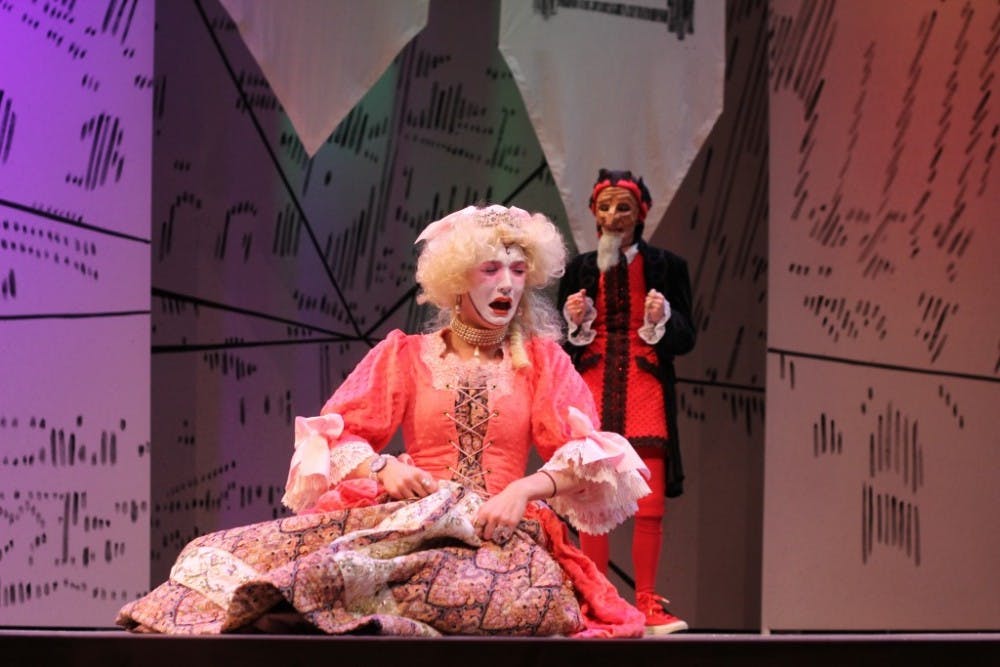“Commedia dell’arte”: a genre of theater marked by character masks, improvisation and — of course — humor. The tradition began in 16th century Italy, where actors used outdoor stages and basic props to tell stories.
This weekend, the tradition will arrive at Elon University accompanied by intricate costumes and extensive scenery in the form of “Servant of Two Masters.”
The play tells the tale of the servant Truffaldino. His master, Beatrice, disguises herself as her dead brother to seek out his killer, who is also her lover. While she works to avenge her brother, Truffaldino inadvertently becomes the servant of the killer — hence the play’s title — and races around the city attempting to please both masters. Unsurprisingly, hilarity ensues.
Kevin Otos, associate professor of theater at Elon, is directing the commedia. He adapted the play by modifying the script to include common modern phrases, which follows the traditional goal of commedia.
“Commedia has always been anachronistic,” he said. “It has always been a theater for right now.”
In modernizing the play, Otos was challenged to live up to commedia’s traditionally multilingual standards.
In the 16th century, when commedia troupes traveled to perform, plays were often performed in the language spoken by the majority of the audience. The actors who could speak the local language would perform the scenes most important to the plot, and the remaining actors used their native tongue and physical comedy in their roles.
According to Otos, this tradition didn’t make the transition to the United States.
“It hasn’t been part of our tradition here in the states as much as it has in Europe,” he said.
Otos has taken these challenges on, and he believes the play has already been successful. In rehearsals, the actors have presented him with opportunities to add improvisations to the script.
The use of masks is one of the most important aspects of commedia. Many actors in the play wear character masks that cover their faces above the mouth. They need a great deal of practice using the mask to convey emotions in different ways.
“If the design is done well, the mask will be able to ‘play,’ which means that the expression of the mask is frozen, but based on what the actor’s doing with the body and the voice, the mask’s expression will appear to change,” Otos said.
All the masks for “Servant of Two Masters” were made specifically for this performance. The mask maker used molds to sculpt the shape of the masks and then formed leather over the molds.
Actors have been rehearsing with masks made of neoprene, a synthetic rubber material, while the masks for the show are being finished. Though they feel different from the leather masks, practicing with them allows actors to grow accustomed to performing with the full costumes.
Junior Lauren Richards, who plays Beatrice, will be wearing heavy makeup instead of a mask. But Richards has observed the techniques her fellow cast members use to give life to the static masks.
“Each mask represents a special type of character, and the minute you put it on, you want to become that character in every way you possibly can,” Richards said. “With the characters that have a physical mask on, their entire body tries to match the mask.”
“Servant of Two Masters” is set in Venice during no specific time period, though modern adaptations often incorporate costumes from 1743, when the play was written.
“One of my favorite things about the costumes is that our costume designer, Jack Smith, gave us all modern shoes,” Richards said.
All of the actors wear high- or low-top converse, rather than pointy heels and dress shoes, with their Italian renaissance-era costumes.
In addition to present-day dialogue and modern costume elements, Richards said audiences will see a lot of humor, emotion and talent when they see “Servant of Two Masters.”
“You’ve got some romance, you’ve got some comical drama,” she said. “You also have lots of jokes. They can definitely expect a happy ending.”
Most importantly, Otos said, audiences should not expect to see the average stage play, if there is such a thing. Commedia dell’arte offers a theater experience that is very different from any other genre.
“The reason I think people like commedia is not because of the masks or the stylized movement or the physical comedy,” Otos said. “Commedia, at its best, is a celebration of life.”
Performances of “Servant of Two Masters” will be in McCrary Theatre at 7:30 p.m. Thursday, April 16 through Saturday, April 18 and at 2 p.m. Sunday, April 19. Tickets are required for entrance.


